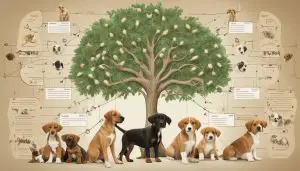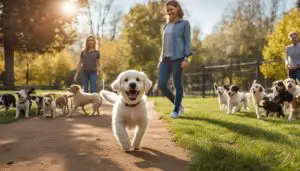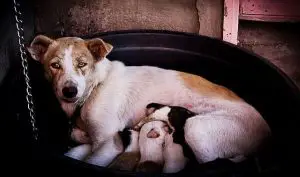When ethical breeders have unsold puppies, they may explore various options such as advertising, reducing prices, or giving them more training. They may also seek reputable homes through adoption, or work with rescue organisations to ensure the puppies find suitable, loving homes.
Breeding can be tremendously rewarding. With litters of anywhere from a single pup to up to 20, however, you might reasonably wonder what breeders do with unsold puppies who don’t find a home.
If you’re curious, you can check out my post on how many puppies a Dalmatian can have.
In the rest of this piece, I’ll address the question of what happens to unsold puppies and what happens to ones that aren’t adopted. Later, I’ll talk about if you can return a puppy to the breeder. First, though, let’s find out if breeders ever euthanise any unsold puppies.

Table of Contents
- Do breeders euthanise puppies that don’t sell?
- What happens to puppies aren’t adopted?
- Can I return a puppy to the breeder?
- Conclusion: What do breeders do with unsold puppies?
- Read more "Puppy Posts"
Do breeders euthanise puppies that don’t sell?
The short answer is no. No shelter or vet would agree to that.
If a pup does need to be put to sleep, it would be as a last resort and will likely be due to a health condition, or behavioural problem that would severely impact the puppy’s quality of life. This might be:
- A deformity that’s causing them pain.
- An illness or medical condition that causes evident suffering.
- An overly aggressive tendency that could pose a danger to members of the public or other dogs.
Breeders have a responsibility to ensure dogs can live their best life, and to ensure that other dogs and humans aren’t threatened by overly aggressive dogs.
For that reason, it’s sometimes necessary to put dogs down, either to relieve them from pain and suffering or to safeguard the public.
Remember, breeders will not put puppies to sleep simply because they don’t sell.
What happens to puppies aren’t adopted?
What happens to unsold puppies depends on whether breeders are responsible or not.
Ethical breeders
Responsible breeders will advertise that a mother is expecting puppies and generate interest in the litter. By the time the mother goes into labour, breeders will likely have a waiting list of people interested in buying a puppy.
Sometimes people on the waiting list will change their mind or pull out without any given reason, leaving some pups unsold.
Now the breeder will go through certain steps. They will:
- Share any available puppies online, normally in appropriate forums on social media to see if they can get anyone interested.
- Decide if perspective owners are a good fit to own a puppy when applications come in. If the breeder thinks the prospective owners are suitable, the pup will have found their forever home. If not, they will continue searching.
- Start raising the pups as their own if they remain unsold for longer than 8 weeks. The pups will be potty trained and become a member of the family. This doesn’t mean the breeder will stop looking for a forever home for the dogs, because adult dogs can be adopted too. Otherwise, the unsold pups will stay with the breeder for good.
Read “Are Cavapoos easy to potty train?” for more on the training process.
Unscrupulous breeders
Obviously irresponsible breeders, such as puppy farms, don’t do what you’d expect. Unethical breeders are in the business solely for profit, and they typically don’t put the puppies’ or mother’s well-being at the forefront of their concerns.
This means unsold puppies from unethical breeders or puppy mills don’t always end up in the best hands.
These breeders will try to sell their puppies off cheaply on commercial websites. Some may even stand outside of pet shops with a box of puppies to sell for cash.
If the puppies still don’t sell, they may be taken to a local animal shelter, or kept into adulthood to breed more to puppies and thus make more money for the breeder.
Now it’s time to find out if you can return a puppy if it doesn’t work out.
Can I return a puppy to the breeder?
Sometimes, for whatever reason, a pup finds a home, but something doesn’t work out. Maybe the family has money troubles, had an emergency of some sort, or the pup doesn’t fit in well with the family.
Sometimes, then, puppies are returned to the breeder.
Any responsible breeder should take puppies back, especially if they’re found to suffer from a hereditary health problem or if the pup shows signs of being aggressive.
Such pups will usually either be rehomed or stay with the breeder.
Unscrupulous breeders though will just ghost you and stop returning your calls., so you'll pretty much be on your own.
Of course, nothing would persuade me to return my Cavapoo, Bean, but this shows it’s best to do your research when on the lookout for a puppy. That way, you can find a reputable breeder and avoid facing any such problems should the need to return a pup arise.
If you want, you can find out how to identify your dog breed.
Conclusion: What do breeders do with unsold puppies?
Responsible breeders will always prioritise the health and well-being of any unsold puppies. They will try to find them a home through advertising, additional training, and networking.
No good breeder will put dogs down unless they must.
We’ve seen the importance of finding a reputable, ethical, and responsible breeder if you’re a perspective puppy owner, but if you do your research and find a good breeder, you’ll have no cause to worry.
You can set yourself and your canine companion up for a healthy, happy life that’s full of adventure.
The ultimate goal of a reputable breeder is to ensure the well-being and long-term happiness of the puppies they have bred, regardless of whether they are sold or kept.
Read more "Puppy Posts"
- Can Puppies Look Like Their Grandparents? Unravelling the Mystery!
 Have you ever noticed a striking resemblance between your new puppy and their grandparents? Perhaps they share the same colouring or have similar facial features? It's not uncommon for puppies to resemble their grandparents, and in this article, I will explore the fascinating topic of whether this is possible and why it happens. We will… Read more: Can Puppies Look Like Their Grandparents? Unravelling the Mystery!
Have you ever noticed a striking resemblance between your new puppy and their grandparents? Perhaps they share the same colouring or have similar facial features? It's not uncommon for puppies to resemble their grandparents, and in this article, I will explore the fascinating topic of whether this is possible and why it happens. We will… Read more: Can Puppies Look Like Their Grandparents? Unravelling the Mystery! - When Do Puppies Require Less Supervision? A Detailed Guide.
 As a new puppy owner, it's important to keep a close eye on your furry friend. Puppies are curious and energetic, which means they require constant supervision to stay safe. However, as your puppy grows and develops, they will start to become more independent and require less supervision. But when exactly do puppies require less… Read more: When Do Puppies Require Less Supervision? A Detailed Guide.
As a new puppy owner, it's important to keep a close eye on your furry friend. Puppies are curious and energetic, which means they require constant supervision to stay safe. However, as your puppy grows and develops, they will start to become more independent and require less supervision. But when exactly do puppies require less… Read more: When Do Puppies Require Less Supervision? A Detailed Guide. - Can Puppy Eat Salmon? – A Friendly Guide to Feeding Puppies
 Welcome to our friendly guide on whether it is safe for a puppy to eat salmon. As a pet owner, you want to ensure that your furry friend is receiving the best possible nutrition to support their well-being. Salmon is a nutritious fish that provides several health benefits for dogs, but is it safe for… Read more: Can Puppy Eat Salmon? – A Friendly Guide to Feeding Puppies
Welcome to our friendly guide on whether it is safe for a puppy to eat salmon. As a pet owner, you want to ensure that your furry friend is receiving the best possible nutrition to support their well-being. Salmon is a nutritious fish that provides several health benefits for dogs, but is it safe for… Read more: Can Puppy Eat Salmon? – A Friendly Guide to Feeding Puppies - Carrots for Puppies Teething: A Natural Solution for Pain Relief
 When your little furry friend is going through the teething process, it can be a challenging time for both of you. Thankfully, there are natural remedies that can help relieve their pain while promoting overall health. One such remedy is carrots for puppies teething. Carrots are an excellent source of vitamins and minerals that can… Read more: Carrots for Puppies Teething: A Natural Solution for Pain Relief
When your little furry friend is going through the teething process, it can be a challenging time for both of you. Thankfully, there are natural remedies that can help relieve their pain while promoting overall health. One such remedy is carrots for puppies teething. Carrots are an excellent source of vitamins and minerals that can… Read more: Carrots for Puppies Teething: A Natural Solution for Pain Relief - How long do puppies need milk?
 Puppies typically need milk as their primary source of nutrition until they are around 4 to 6 weeks old. After that, they can gradually transition to solid food, but it's essential to consult a vet for guidance on the appropriate time to introduce solids to ensure the puppies' needs are met. Welcoming a litter of… Read more: How long do puppies need milk?
Puppies typically need milk as their primary source of nutrition until they are around 4 to 6 weeks old. After that, they can gradually transition to solid food, but it's essential to consult a vet for guidance on the appropriate time to introduce solids to ensure the puppies' needs are met. Welcoming a litter of… Read more: How long do puppies need milk?
